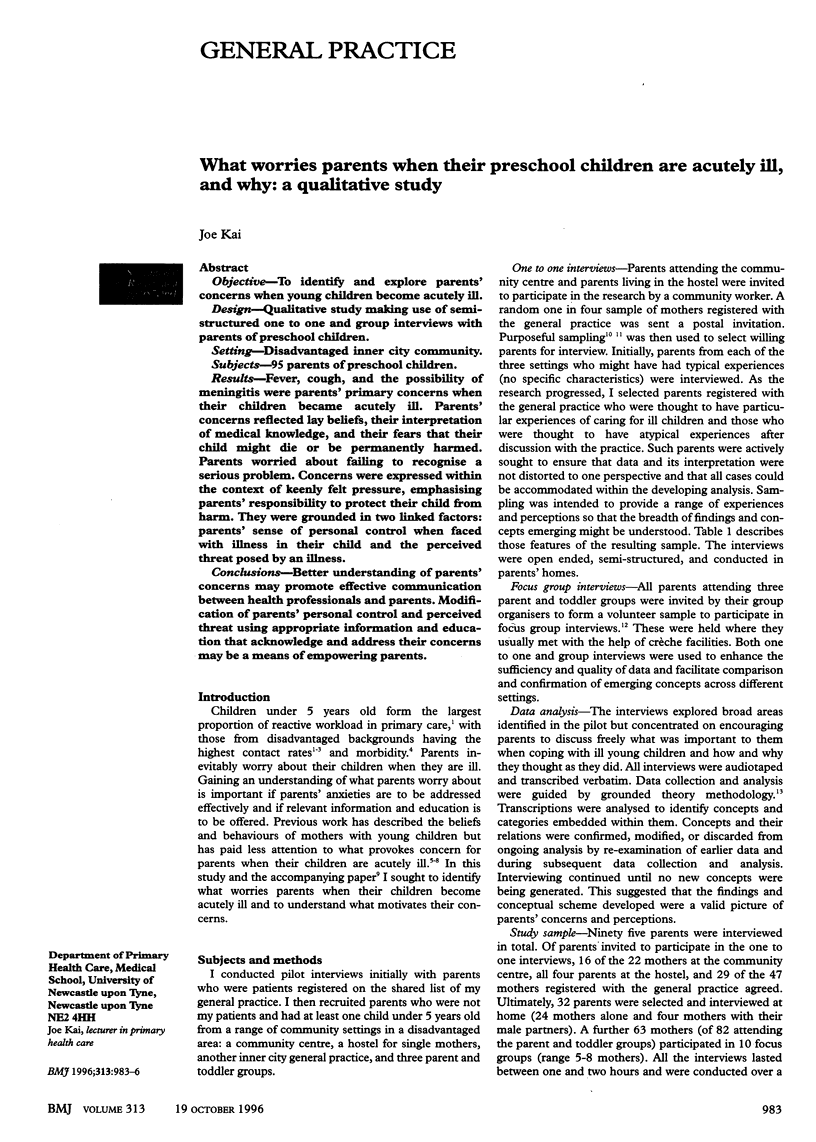What worries parents when their preschool children are acutely ill, and why: a qualitative study (original) (raw)
Abstract
OBJECTIVE: To identify and explore parents' concerns when young children become acutely ill. DESIGN: Qualitative study making use of semi-structured one to one and group interviews with parents of preschool children. SETTING: Disadvantaged inner city community. SUBJECTS: 95 parents of preschool children. RESULTS: Fever, cough, and the possibility of meningitis were parents' primary concerns when their children became acutely ill. Parents' concerns reflected lay beliefs, their interpretation of medical knowledge, and their fears that their child might die or be permanently harmed. Parents worried about failing to recognise a serious problem. Concerns were expressed within the context of keenly felt pressure, emphasising parents' responsibility to protect their child from harm. They were grounded in two linked factors: parents' sense of personal control when faced with illness in their child and the perceived threat posed by an illness. CONCLUSIONS: Better understanding of parents' concerns may promote effective communication between health professionals and parents. Modification of parents' personal control and perceived threat using appropriate information and education that acknowledge and address their concerns may be a means of empowering parents.

Selected References
These references are in PubMed. This may not be the complete list of references from this article.
- Campion P. D., Gabriel J. Child consultation patterns in general practice comparing "high" and "low" consulting families. Br Med J (Clin Res Ed) 1984 May 12;288(6428):1426–1428. doi: 10.1136/bmj.288.6428.1426. [DOI] [PMC free article] [PubMed] [Google Scholar]
- Cornford C. S., Morgan M., Ridsdale L. Why do mothers consult when their children cough? Fam Pract. 1993 Jun;10(2):193–196. doi: 10.1093/fampra/10.2.193. [DOI] [PubMed] [Google Scholar]
- Hallam L. Primary medical care outside normal working hours: review of published work. BMJ. 1994 Jan 22;308(6923):249–253. doi: 10.1136/bmj.308.6923.249. [DOI] [PMC free article] [PubMed] [Google Scholar]
- Hurwitz B. The new out of hours agreement for general practitioners. BMJ. 1995 Sep 30;311(7009):824–825. doi: 10.1136/bmj.311.7009.824. [DOI] [PMC free article] [PubMed] [Google Scholar]
- Kai J. Parents' difficulties and information needs in coping with acute illness in preschool children: a qualitative study. BMJ. 1996 Oct 19;313(7063):987–990. doi: 10.1136/bmj.313.7063.987. [DOI] [PMC free article] [PubMed] [Google Scholar]
- Kramer M. S., Naimark L., Leduc D. G. Parental fever phobia and its correlates. Pediatrics. 1985 Jun;75(6):1110–1113. [PubMed] [Google Scholar]
- Mays N., Pope C. Rigour and qualitative research. BMJ. 1995 Jul 8;311(6997):109–112. doi: 10.1136/bmj.311.6997.109. [DOI] [PMC free article] [PubMed] [Google Scholar]
- Schmitt B. D. Fever phobia: misconceptions of parents about fevers. Am J Dis Child. 1980 Feb;134(2):176–181. [PubMed] [Google Scholar]
- Spencer N., Logan S., Scholey S., Gentle S. Deprivation and bronchiolitis. Arch Dis Child. 1996 Jan;74(1):50–52. doi: 10.1136/adc.74.1.50. [DOI] [PMC free article] [PubMed] [Google Scholar]
- Wyke S., Hewison J., Russell I. T. Respiratory illness in children: what makes parents decide to consult? Br J Gen Pract. 1990 Jun;40(335):226–229. [PMC free article] [PubMed] [Google Scholar]